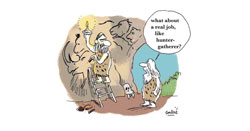Does Practicality Outweigh Passion?
 As an education and history student, I hear all the time about how I will never make a decent amount of money. Growing up I was always told I should go into a field like law or nursing, where I could have a better salary. I’ve also heard countless times that if I was to be a teacher I should teach something more “important” like math or science as opposed to history.
As an education and history student, I hear all the time about how I will never make a decent amount of money. Growing up I was always told I should go into a field like law or nursing, where I could have a better salary. I’ve also heard countless times that if I was to be a teacher I should teach something more “important” like math or science as opposed to history.
There seems to be this idea that majors such as business, nursing and others of that nature are more practical in comparison to majors in the realm of humanities like fine art, communication, and history.
Why is it that these majors have a reputation for not being useful in the real world?
Dave DePaola, a junior music industry and business management student, has a true love for playing music and would dream of being a professional musician. However, the idea that music isn’t a very practical field to enter is ultimately affecting his decision.
“I don’t expect to ever be successful professionally as a musician, and so working in the industry is the next best thing. I treat my business major as a practical supplement to my music industry major,” said DePaola.
Many students believe having a degree in business will help them be more prepared for the job market in the future. DePaola continued to explain what he learns as a part of the business school, “Within the School of Business [at the University] there are various concentrations one can choose from such as management, finance, or marketing. Even when you concentrate in something, the classes we are required to take in the business program teach us skills including the financial workings of businesses, techniques for marketing, and management skills,” he explained.
Although getting a degree in business proves to be beneficial for many students, that is not to say a degree in a different field, like the humanities, would be less “practical.”
Corey Dzenko, an assistant professor in the Art and Design Department, explained, “Students who major in fine art and design learn many valuable skills, such as how to solve problems, think creatively, communicate effectively in both visual and written forms, and interpret visual culture, artworks and visual media of all kinds.”
Dzenko continued, “Furthermore, art and design students learn about various cultures across history by taking art history courses, which helps them understand their place in the world and can help them become more critically engaged citizens in society.”
Having received her PhD in Art History from the University of New Mexico and her Master’s from the University of Alabama, Dzenko finds great value in analyzing and interpreting contemporary art and enjoys teaching these values to her students.
Kelly Currie, a junior fine arts student, said, “Art history is important for everyone because it helps us know history and culture through the eyes of those who lived it and that is important for us now because it helps us interpret the world around us and better understand ourselves.”
Currie continued, “Learning art history is important for me personally because when I want to create something it gives me insight on how to construct my own art.”
These kinds of skills and values that are typically viewed as “impractical” are just as important, maybe even a more so, in the work force when compared to the skills of the more “practical” majors.
Dzenko said, “Studying art and design has real benefits for students and a variety of real world, ‘practical’ applications. After graduation, students can employ what they’ve learned in their own artistic practices, as part of a collaborative and creative professional team, in museum and community arts organizations, and even outside of the “art world.”
These applications can be seen through the ambitions of students like Currie, who also has a minor in psychology. She shared, “I have a love for art and psychology, so I’m glad to be able to share this with people in school and through my anticipated occupation.”
Curried continued, “I believe that art could truly be an aid to the mental health field as a means for communication and expression by individuals.”
Every major has it’s own set of valuable skills to be learned and applied in the future. For some majors, however, these skills may not be as evident to everyone, but many students find them to be extremely useful for their future careers.
We should not need to define practicality by the salary or demand of certain careers, rather by the effect each job can have on any given aspect of society.
IMAGE TAKEN from theodysseyonline.com


